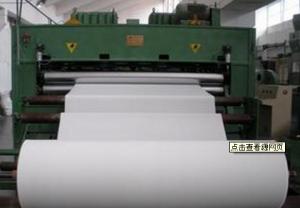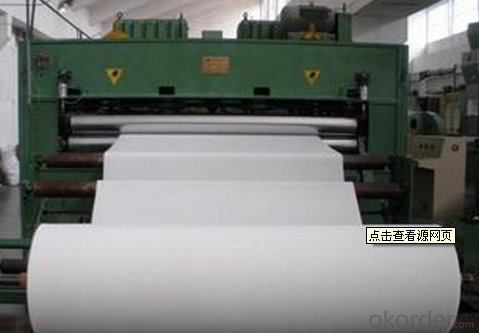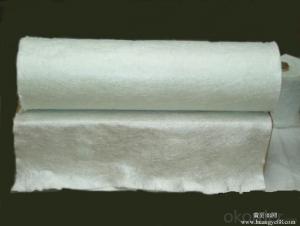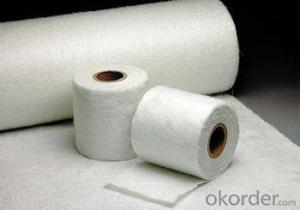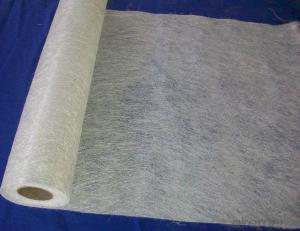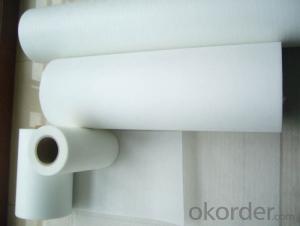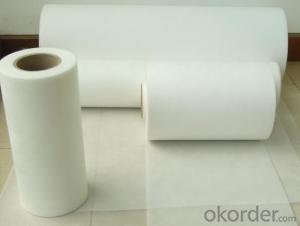Fiberglass Mat Tissue E Glass Fiber Stitched Mat for FRP Industry
- Loading Port:
- Shanghai
- Payment Terms:
- TT or LC
- Min Order Qty:
- 10000 kg
- Supply Capability:
- 200000 kg/month
OKorder Service Pledge
OKorder Financial Service
You Might Also Like
Brief Introduction
The stitched mat is made of chopped strand which randomly dispersed and be stitched together by polyester thread. The width is available from 150-2400mm.Density of mat generally is 300-600g/m2.
The product is compatible with Polyester resin, vinyl ester resin, and epoxy resin.
Stitched mat is mostly primarily in pultrusion, RTM, filament winding, compression molding and hand lay up processes.
It is widely used in pipe lining, pultrusion section, storage tanks, FRP boat, insulation panel etc.
Main Features
Uniform thickness, good wet tensile strength retention.
Good mould-ability, good drapability and easy operation.
Good wet out speed and high efficiency in production.
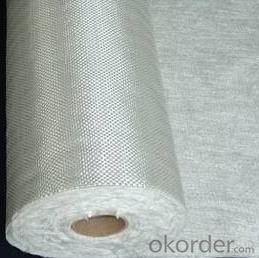
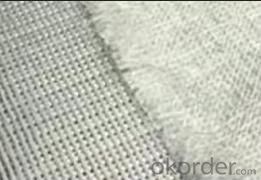
Technical Specification
Code | Density(g/m2) | Chopping layer density g/m2 | Width mm |
EMK225 | 225 | 225 | 150~2600 |
EMK250 | 250 | 250 | 150~2600 |
EMK300 | 300 | 300 | 150~2600 |
EMK450 | 450 | 450 | 150~2600 |
EMK600 | 600 | 600 | 150~2600 |
FAQ
1. Why Choose us?
CNBM is a stated own company, provide the guarantee for the best quality, best service and safety business.
2. How will we guarantee the quality?
a, ISO 9001-2008 quality control system;
b, Strict and regular quality control in production;
c, Inspeciation when loading into container before shippment;
d, Sample stock for one year for quality tracing and record.
3. What is your MOQ?
Our MOQ is one pallet.
4. Can you provide sample?
Yes, samples are in stock. we can offer free sample for you.
5. Payment terms?
We can accept L/C, T/T etc.
- Q: What are the factors that affect the diameter of electrospun nanofibers?
- High efficiency air filter, air filter (HEPA filter) is widely applied to the requirements of clean and sterile room (electronic goods and drug manufacturing sites, operation room) and other applications (such as air purifiers, vacuum bag filter and mask). Superfine glass fiber mat, melt blown (MB) fiber network, electrospun fiber mesh and ePTFE film and other media can reach...
- Q: How is fiberglass mat tissue used in the construction industry?
- Fiberglass mat tissue is commonly used in the construction industry as a reinforcement material. It is applied to various surfaces, such as walls, roofs, and flooring, to enhance their strength and durability. The fiberglass mat tissue is often embedded in resin or other binding agents to form a composite material that can withstand heavy loads and resist cracks. Its widespread use in construction helps to increase the structural integrity of buildings and ensures long-lasting performance.
- Q: Can fiberglass mat tissue be used for insulating radiant floors?
- Indeed, insulating radiant floors is possible with the use of fiberglass mat tissue. This material, known for its exceptional thermal properties and moisture resistance, is widely favored for insulation purposes. Specifically engineered to enhance the strength and endurance of the insulation layer, fiberglass mat tissue effectively inhibits heat loss and enhances energy efficiency in radiant floor systems. By creating a shield between the heated floor and the colder ground or subfloor, it effectively prevents heat escape. Moreover, installing fiberglass mat tissue is hassle-free, as it can be easily tailored to fit any desired shape or size. This remarkable adaptability makes it a versatile option for insulating radiant floors.
- Q: Can fiberglass mat tissue be used for ceiling insulation?
- No, fiberglass mat tissue is not suitable for ceiling insulation. While fiberglass mat tissue is commonly used in various construction applications, such as reinforcing plaster or other building materials, it is not designed or recommended for insulation purposes. When it comes to ceiling insulation, there are specific materials that are more suitable and effective, such as fiberglass batts, cellulose, or foam insulation. These materials are specifically engineered to provide thermal resistance and reduce the transfer of heat between the interior and exterior of a building. Using fiberglass mat tissue as ceiling insulation would not only be ineffective in providing proper insulation, but it may also pose safety risks. Fiberglass mat tissue is typically thin and lacks the necessary thickness to effectively insulate ceilings. Additionally, fiberglass insulation materials are known to release airborne particles and fibers, which can be hazardous to health if inhaled. Therefore, it is important to use the appropriate insulation materials that are specifically designed for ceiling insulation to ensure energy efficiency, comfort, and safety in your home or building.
- Q: Does fiberglass mat tissue require any special precautions during disposal?
- Special precautions are necessary when disposing of fiberglass mat tissue. The composition of fiberglass mat tissue can result in the release of fine particles and fibers into the air if it is handled or broken. These particles and fibers can be harmful if they are inhaled or come into contact with the skin and eyes. Therefore, it is important to take certain precautions when disposing of fiberglass mat tissue. To begin with, it is advisable to wear suitable personal protective equipment (PPE) such as gloves, goggles, and a respirator mask in order to minimize the risk of exposure. This will help to prevent the inhalation of airborne particles and fibers, as well as protect the skin and eyes from any potential irritation. Additionally, fiberglass mat tissue should be placed in sealed bags or containers during disposal to prevent loose fibers from becoming airborne during transportation. It is also recommended to label these bags or containers as "hazardous" or "fiberglass waste" so that others are aware of the potential risks involved. Furthermore, it is vital to adhere to local regulations and guidelines for the disposal of fiberglass mat tissue. Depending on the specific location, there may be specific requirements for handling and disposing of hazardous waste materials, including fiberglass. These regulations exist to safeguard public health and the environment. In conclusion, special precautions are necessary when disposing of fiberglass mat tissue in order to minimize the risk of exposure to harmful particles and fibers. Wearing appropriate protective equipment, using sealed containers, and following local regulations are all crucial steps to ensure safe disposal practices.
- Q: Can fiberglass mat tissue be used for attic insulation?
- Fiberglass mat tissue is not typically used as a primary insulation material for attics. While it does offer some thermal resistance, it is generally designed to be used in conjunction with other insulation materials, such as fiberglass batts or blown-in insulation, to enhance their performance. Fiberglass mat tissue is often used as a facing material for insulation products, serving as a vapor barrier or as a reinforcement layer. It can help improve the durability and moisture resistance of the insulation, but its main purpose is not to provide significant thermal insulation on its own. When insulating an attic, it is more common to use materials specifically designed for thermal insulation, such as fiberglass batts, cellulose, or spray foam insulation. These materials have higher R-values and are more effective at reducing heat transfer, which is crucial for maintaining a comfortable indoor temperature and energy efficiency. In summary, while fiberglass mat tissue may have some insulating properties, its primary role is to enhance the performance of other insulation materials rather than being used as the sole insulation for an attic.
- Q: Can fiberglass mat tissue be used for making lightweight automotive parts?
- Yes, fiberglass mat tissue can be used for making lightweight automotive parts.
- Q: Is the Teflon gasket filled with fiberglass or graphite?
- PTFE generally used in static sealing, flange what, dynamic seal with FFKM, chemical resistance and PTFE, but with rubber elasticity
- Q: Is fiberglass mat tissue suitable for HVAC insulation?
- Yes, fiberglass mat tissue is suitable for HVAC insulation. Fiberglass mat tissue is a lightweight and flexible material that is commonly used in insulation applications due to its excellent thermal insulation properties. It provides effective heat insulation, helping to maintain a comfortable and energy-efficient environment within HVAC systems. Additionally, fiberglass mat tissue is resistant to moisture and does not promote the growth of mold or mildew, making it a suitable choice for HVAC insulation where condensation and moisture may be present. It is also easy to install and can be cut to fit around HVAC components, ensuring a proper and tight insulation seal. Overall, fiberglass mat tissue is a reliable and durable insulation material that is widely used in HVAC systems to enhance energy efficiency and thermal performance.
- Q: Can fiberglass mat tissue be used for repairing fiberglass RVs?
- Yes, fiberglass mat tissue can be used for repairing fiberglass RVs. Fiberglass mat tissue is a lightweight, flexible material that is commonly used for reinforcing and repairing fiberglass structures. It is designed to be easily molded and shaped to fit the contours of the damaged area, making it ideal for repairing RVs, which often have curved surfaces. To repair a fiberglass RV using fiberglass mat tissue, the damaged area needs to be cleaned and prepared by removing any loose or damaged fiberglass. The mat tissue is then cut to the appropriate size and shape to cover the damaged area. A suitable fiberglass resin or adhesive is applied to both the damaged area and the backside of the mat tissue. The tissue is then carefully placed over the damaged area and pressed down to ensure proper adhesion. Once the repair is complete, the fiberglass resin or adhesive is allowed to cure according to the manufacturer's instructions. After curing, the repaired area can be sanded, primed, and painted to match the rest of the RV's exterior. It is important to note that fiberglass mat tissue is typically used for smaller repairs and cosmetic damage. For larger structural repairs, it may be necessary to use additional reinforcement materials such as fiberglass cloth or woven roving. It is recommended to consult with a professional or refer to specific repair guides for detailed instructions on repairing fiberglass RVs.
Send your message to us
Fiberglass Mat Tissue E Glass Fiber Stitched Mat for FRP Industry
- Loading Port:
- Shanghai
- Payment Terms:
- TT or LC
- Min Order Qty:
- 10000 kg
- Supply Capability:
- 200000 kg/month
OKorder Service Pledge
OKorder Financial Service
Similar products
Hot products
Hot Searches
Related keywords
